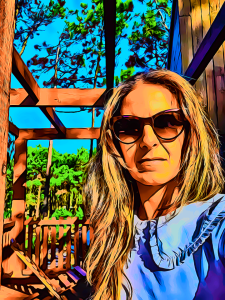128 Letter from Filipa Brandão

Dear future women tourism researcher,
I was asked to write a letter to future female tourism researchers, one that could include some important reflections about my career and that could contribute to the way you will develop your professional path. I tried to think about my own path in the last years, about the advice I would have liked to be given along the way, and that I try to give to my students. Here they are:
Invest in yourself and have fun learning! I decided that I wanted to pursue an academic career in tourism when I concluded my undergraduate degree. I immediately applied to a Master programme in Tourism Management and Planning and, after its conclusion, I enrolled in a PhD in Tourism. At the time, I applied to a very competitive research grant from the Portuguese Science and Technology Foundation, and I was very fortunate to receive it. This allowed me to dedicate exclusively to my PhD research. Not being involved in other professional activities provided the necessary conditions for me to study and to learn a lot during those four years. And it also taught me that a PhD is so much more than a thesis… it is a moment in time when we can invest in ourselves and increase our knowledge pool in many different areas of expertise. So here is my first advice: have fun learning and exploring many different types and areas of knowledge while doing research. Good research topics, paths and ideas often come from the intersection of distinct and eventually unrelated areas.
Be passionate about research and about what you research. This doesn’t need much explanation, right? Research is hard, it is time consuming, demanding, it means moving forward and backwards many times. When you are doing research, you are extremely involved in a specific topic, and you will see related things everywhere. It is not a nine-to-five job; it is a way of life! So first, you must be very passionate about doing research, and second, you should be very passionate about what you research about. This is fundamental for you to be happy with your choice.
Cooperate and establish solid and productive networks. Despite loving research, there will be many times when you will not be able to do it alone. Hopefully, you will not do research alone after completing your PhD. For you to thrive and to build a solid career, you will need to establish or be involved in collaboration with your students, with colleagues from your institution, from other institutions, or from other countries. It is proved that highly visible research outputs are the ones resulting from cooperation, so select a few colleagues and/or students in your field with which you like to work with and create a solid network for the future. Make sure that they are competent and, above all, good people!
Change the world! Nowadays, research only makes sense if it has a strong social impact. Contributions to science ate obviously always present and mandatory, but social contributions are increasingly important and relevant in tourism research. I cannot see any point in developing studies that will not have the potential to change a community’s life for the better, being people, or businesses. Make sure that your research topics, the methods used, and the outputs have a strong social contribution. Moreover, find ways to monitor that impact and to make it last in the future.
Update on a constant basis. Specialise yourself in one or a few areas and be constantly updated about them, this will make you known and acknowledged in tourism academia. However, don’t be afraid to research new, emerging, and exciting topics that motivate you and that will make you fulfilled.
Make a career plan and work to achieve it. Academic work is very well defined in terms of what you need to be involved in. Teaching and researching are usually the main academic duties, but there are other areas that faculty staff can be engaged, however… Focus on what is important. In an early stage of your career, focus on teaching and researching. Try not to be involved in other academic duties (such as management, coordination, and political positions). They will deviate you from what is fundamental when you are trying to thrive and to consolidate your academic path. This does not mean you will not do it later in your life…
Prefer quality over quantity. In a (academic) world where the moto is “publish or perish”, this may be hard to implement, but trust me that, in time, you will collect the benefits. It is better to publish few papers a year in quality and reputable journals and conferences, than to publish a great number of manuscripts in lower quality sources.
This also means you should learn about dealing with rejection. Yes, many times your papers will be rejected, and your projects will not be funded. But this is part of academic life, and trust me, every single scholar has seen, at some point, their work refused. Learn from it and improve your research outputs accordingly.
Finally, my most important advice is the following: make sure you have the right balance between work and family/social life. And note that the right balance is the one that makes you happy and fulfilled and with which you feel comfortable. There is time for everything, so don’t sacrifice one for the other. There will obviously be times of higher dedication to work, and this is also normal. It’s ok, just make sure you also have times of higher dedication to family and friends. This balance is ultimately what makes you happy.
All the best and many success!
Filipa Brandão

